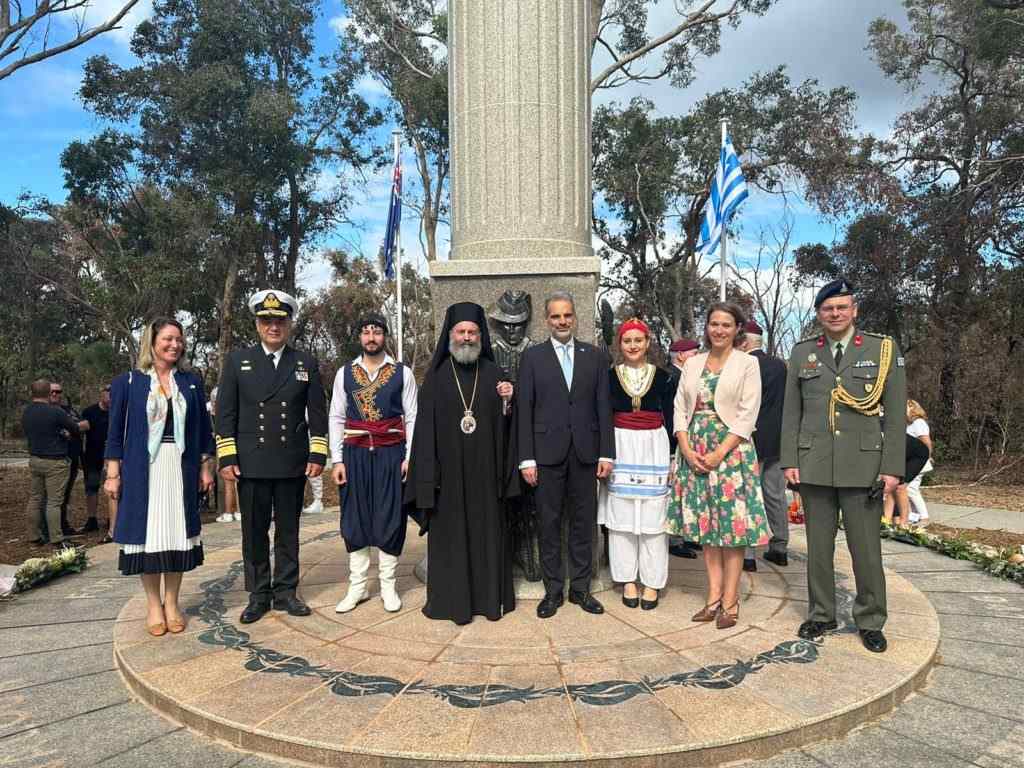In mid-April 1941, a 22-year-old youth from Perth, Australia, disembarked in the bomb-pocked port of Piraeus, and his name was Arthur Leggett. He was a metalworker who in 1939, a few months after Australia entered World War II, enlisted in the army to serve his homeland. Arriving in Piraeus, he had already fought against the Italian army in Libya, in the battles of Bardia and Tobruk; he could not have imagined that the day he first set eyes on Greece would indelibly mark the rest of his life.
Arthur Leggett, now 105 years old, is the last surviving prisoner of war from the Battle of Crete. He was captured, during the fighting by German paratroopers and imprisoned for four years – initially in Thessaloniki and then in German POW camps. He is one of those who contributed to ensuring that Australians never forget the Battle of Crete.
Last month, on May 11, just a few day before the the 83rd anniversary of the Germans’ airborne and amphibious operation to invade and occupy the island of Crete, the unveiling of the first Memorial for the battle took place in Australia. The solemn ceremony took place in the presence of several high-ranking Australian officials. Veteran Arthur Leggett, who has dedicated his life to preserving historical memory, was there.
Years of Efforts
The monument was erected in Kings Park, Perth, after many years of efforts and was built with funds from donations, amounting to hundreds of thousands of dollars. The unveiling ceremony was attended by the Prime Minister of Western Australia, Roger Cook, and the the Governor of Western Australia, Christopher Dawson. Federal Minister for Veterans Matt Keogh, representing the Prime Minister of Australia, was there along with the ambassador of Greece to Australia, Stavros Venizelos, along with representatives of the Australian armed forces, His Eminence Archbishop Makarios of Australia, members of Cretan expatriate associations, the Greek community, and of course, families of Battle veterans.
The Experience in Greece
Leggett rightfully laid the first wreath at the monument.
His experience in Greece was overwhelming. According to his accounts, after a brief stay in an Allied camp in the Dafni district of west Athens, Leggett was transferred to the central town of Kalabaka and then took part in the defense of mountainous Bralos pass. One of his strongest memories was during the defense of the Greek mainland, when he and his fellow soldiers became the target of fierce aerial bombardment by the Luftwaffe, which lasted almost an entire day. As he has said, “they bombed us, they bombarded the whole of Greece,” while he has vividly described the retreat of the Australian units through central Larissa: “We saw the massive destruction caused by the horrific bombings of the Germans on the villages and the city…”
A POW
“I arrived in Crete exhausted,” he recounted, “after a terrible journey, with the ship under German air attack from dawn till dusk for eight hours.” On the island, the war raged fiercely. After participating in a successful 10-day operation to defend the airport of Rethymno, after battles, hunger, hardships, losses of his comrades, and many adventures, he found himself a prisoner in the hands of the Germans.
In a prisoner camp in Thessaloniki, “a dirty, unhealthy, and dangerous place,” the barracks were “full of parasites, without windows, doors, or bunks, with a cold cement floor instead of a bed, minimal food and all-day marches in the countryside.” After Thessaloniki and POW camps in Germany, he was a forced laborer in coal mines in occupied Poland, and after final Nazi death marches, Arthur Leggett was finally liberated in 1945 and repatriated to Perth.
Having lived more than a century, Leggett last year wanted to send his message: “By being here today, I don’t represent only myself, but also all those who never returned home,” he said on ANZAC Day, commemorating the Australians and Kiwis (New Zealanders) who served their homeland and were killed in a faraway battle trying to defend the ancient land of Greece.
“War is a stupid thing…” he bemoaned.



